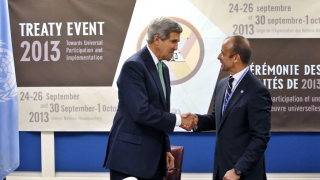Several weeks ago one of my relatives expressed concern about the US becoming a signatory to the UN Arms Trade Treaty – the ATT. At that time I assured her that there was no chance of this treaty being ratified, and I hold to that. I also expressed that I fully expected the US to sign on to the ATT.

This past Wednesday, September 25th, US Secretary of State John Kerry did sign the ATT on behalf of the United States.
The official text of the treaty can be found here, and the UN website for the treaty is located here.
The National Rifle Association’s Institute for Legislative Action (NRA-ILA; by the way this is a great website for following developments on this issue) notes three of the most troublesome clauses in the ATT, finding that this treaty:
1. Includes “small arms and light weapons” within its scope, which covers firearms owned by law-abiding citizens.
2. Urges record keeping of end users, directing importing countries to provide information to an exporting country regarding arms transfers, including “end use or end-user documentation” for a “minimum of ten years.”
3. Urges each country is to “take measures, pursuant to its national laws, to regulate brokering taking place under its jurisdiction for conventional arms.”
The NRA-ILA rightly concludes that “data kept on the end users of imported firearms is a de-facto registry of law-abiding firearms owners, which is a violation of federal law [ed. a federal law already upheld by the Supreme Court]. Even worse, the ATT could be construed to require such a registry to be made available to foreign governments.”
With respect to the text of the ATT these are all true, but the treaty must still be ratified, and the requirement for ratification is a two-thirds “supermajority” of the US Senate which at the moment means 66 of the current 100 seated Senators.
The current make-up of the US Senate is 52 Democrats, 46 Republicans and 2 Independents.
Incidentally, the two Independents are Senator Bernie Sanders a self-proclaimed “Democratic Socialist” from Vermont with a mixed record on gun rights, and Senator Angus King from Maine on the record as
supportive of a long list of anti-gun legislation (search http://www.ontheissues.org/.)
With a requirement for 66 votes to ratify the ATT, and assuming that all 52 Democrats vote in favor – that in itself is highly unlikely, but for the sake of argument let’s say it happens – and both Independents vote in favor, President Obama would still need 12 Republicans to support the ATT as well. That is simply NOT going to happen.
By the way the Vice President’s single vote is only cast when there is a mathematical tie between voting Senators. Since the vote on the ATT requires a two-thirds majority the Vice President’s vote cannot be cast in such a decision.
In fact in July of 2012 Senator Jerry Moran (KS-R) circulated a non-binding letter amongst his colleagues obtaining fifty-one signatures signaling their opposition to the ATT.
Lastly the Supreme Court of the United States (SCOTUS) has the power to render a treaty (or aspects of any treaty, or any law passed supporting any treaty) un-Constitutional.
Since the SCOTUS has already ruled several times in full support of the 2nd Amendment, and since that body has never voted to overturn any of its previous rulings except to re-align with a new Amendment to the original Constitution, it is highly likely that SCOTUS would rule against the ATT.
Here’s an interesting article; “Why Obama-Backed UN Treaties Can’t Trample Constitution” by Doug Book of the Western Center for Journalism.
All that having been said a real danger to our right to keep and bear arms remains.
Because of our two-party system and the stark ideological divisions between those two parties, since taking office in January of 2009 President Obama has governed largely by Executive Order and by his power over the various Departments and Agencies of the government to impose new regulations and policies. For Obama these methods have the benefit of not having to be passed by Congress and actually passed into law.
The Department of Defense, the Internal Revenue Service, the Environmental Protection Agency, the Department of Immigration and Border Protection, the Transportation Security Agency, are only a few of those that were required by pressure from the White House, or through the willing agreement of the bureaucrats that run those organizations, to impose new regulations and policies which have directly and immediately affected Americans without ever having been even considered by Congress.
(See http://foxnewsinsider.com/tag/regulation-nation for more)
Of course these Executive Orders, regulations and policies may be considered “temporary” but even if a President with a radically different ideology is elected in 2016 all of these remain in place until specifically overturned by that new President. That would almost certainly take years, and many would likely remain in effect as the new normal.
Time will tell, but there is nothing in President Obama’s modus operandi since taking office to indicate that there he will not take immediate action against the 2nd Amendment justified by the ATT.
You can expect as much as possible to be done quietly within the depths of the various Agencies and Departments of the US Government. It will likely be many months before this new treaty becomes an issue, and it will probably be the NRA that exposes these issues to the American people.
Our 2nd Amendment rights are under constant assault by those among us who feel that guns are an insidious evil in our society. Their efforts are occasionally obvious, but much more often they wage a quiet war, and they have the clear support of the majority of the mainstream media in America.
Over the years since our Founding Fathers penned the 2nd Amendment those few, simple, powerful words have been interpreted to mean less and less. The ATT is yet another attempt to reduce the 2nd Amendment and is dangerous until it is voted down by the US Senate, which I suspect Senator Harry Reid will delay as long as possible since he knows he does not have the votes to succeed.
In response to the United States’ signing of the UN Arms Trade Treaty Theodore Bromund wrote the article below in which he highlights just how American gun owners might feel the effects of the ATT almost immediately, and addresses the concept of “object and purpose” with respect to newly signed but un-ratified treaties.
—–
“UN Arms Treaty will be menace to US for years to come”
By Theodore Bromund | Fox News
September 25, 2013
http://www.foxnews.com/opinion/2013/09/25/un-arms-treaty-will-be-menace-to-us-for-years-to-come/
Secretary of State John Kerry’s signature of the U.N. Arms Trade Treaty Wednesday was a serious error, one that will have far-reaching consequences for American foreign policy and American sovereignty. Those consequences will be even worse because the Senate, which has signaled many times that it is opposed to the treaty, will likely have no real opportunity to reject it.
It’s commonly said that the Senate has to provide its advice and consent to any treaty – commonly known as ratifying it – before it can take effect. That’s true, but there’s a loophole. Once the U.S. signs a
treaty, we hold ourselves bound not to violate the treaty’s “object and purpose.”
In other words, we obey in practice treaties that the Senate has never ratified.
This rule is an old one, and it used to make some sense. It would be dishonorable to sign a treaty with another country, do all the things prohibited by the treaty, and then ratify it. But that was a different
era.
Today, treaties are not just about international conduct. They seek to regulate how we raise our children, how we treat the disabled, and how we manage our firearms market.
As a result, the old requirement not to violate the “object and purpose” of a signed treaty has become a way to evade the need for Senate ratification. And in the case of the Arms Trade Treaty, the problem is
even worse. The administration will argue that it already has all the powers it needs to enforce the treaty.
In the Gun Control Act of 1968 and the Arms Export Control Act, Congress gave the Executive Branch the power to control both the import and export of firearms – indeed, of weapons of all kinds. This power is
virtually unfettered. All the president has to do is to assert that a particular firearm is not suitable for “sporting” purposes and, under the 1968 Act, he can ban its import.
We have recently seen an example of this with the executive actions banning the import of Korean War vintage M1 Garand rifles, which the White House justified as a gun control measure. And since many U.S. gun manufacturers rely on imported parts and components, or financing and insurance from abroad, the Treaty also gives other countries new opportunities to affect the U.S. firearms market.
But it is the Treaty’s vague norms that pose the biggest long-term problem. At the heart of the Treaty are terms like “international humanitarian law” and “international human rights law.” By committing
itself to uphold these terms, the U.S. is binding itself to meet requirements that it does not define. That will affect not only our domestic firearms market but our foreign policy.
Over the coming years, the treaty’s proponents will seek to expand what those vague terms include. Since the U.N. has already defined gun control as a human right, they will not have to work very hard to make it part of the treaty. By signing the Treaty, the U.S. has tied itself to a conveyor belt: it is no longer in control of where it is going.
Opponents of the treaty are not powerless. Sen. Jerry Moran (R-Kan.), Sen. Jim Inhofe (R-Okla.), and other colleagues, along with Rep. Mike Kelly (R-Penn.) in the House, have made it clear that Congress is deeply skeptical about the treaty.
They can continue to voice their opposition, including by calling for hearings. In the end, a U.S. president can ‘unsign’ the treaty.
All of those actions are wise responses to a serious error by the Obama administration, one that will be a menace for years to come.


